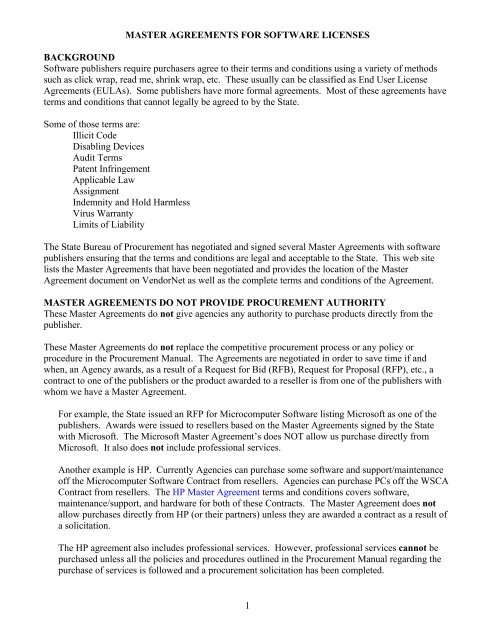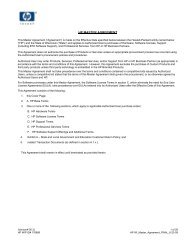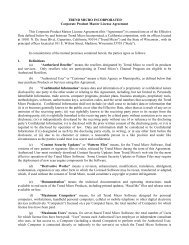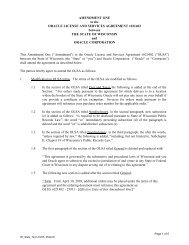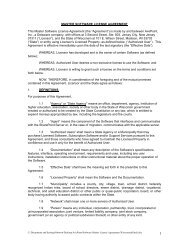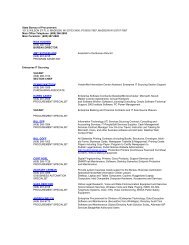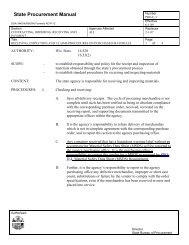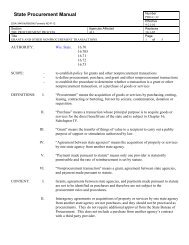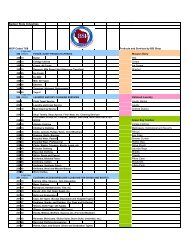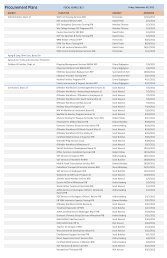Master License Agreement - VendorNet
Master License Agreement - VendorNet
Master License Agreement - VendorNet
You also want an ePaper? Increase the reach of your titles
YUMPU automatically turns print PDFs into web optimized ePapers that Google loves.
MASTER AGREEMENTS FOR SOFTWARE LICENSES<br />
BACKGROUND<br />
Software publishers require purchasers agree to their terms and conditions using a variety of methods<br />
such as click wrap, read me, shrink wrap, etc. These usually can be classified as End User <strong>License</strong><br />
<strong>Agreement</strong>s (EULAs). Some publishers have more formal agreements. Most of these agreements have<br />
terms and conditions that cannot legally be agreed to by the State.<br />
Some of those terms are:<br />
Illicit Code<br />
Disabling Devices<br />
Audit Terms<br />
Patent Infringement<br />
Applicable Law<br />
Assignment<br />
Indemnity and Hold Harmless<br />
Virus Warranty<br />
Limits of Liability<br />
The State Bureau of Procurement has negotiated and signed several <strong>Master</strong> <strong>Agreement</strong>s with software<br />
publishers ensuring that the terms and conditions are legal and acceptable to the State. This web site<br />
lists the <strong>Master</strong> <strong>Agreement</strong>s that have been negotiated and provides the location of the <strong>Master</strong><br />
<strong>Agreement</strong> document on <strong>VendorNet</strong> as well as the complete terms and conditions of the <strong>Agreement</strong>.<br />
MASTER AGREEMENTS DO NOT PROVIDE PROCUREMENT AUTHORITY<br />
These <strong>Master</strong> <strong>Agreement</strong>s do not give agencies any authority to purchase products directly from the<br />
publisher.<br />
These <strong>Master</strong> <strong>Agreement</strong>s do not replace the competitive procurement process or any policy or<br />
procedure in the Procurement Manual. The <strong>Agreement</strong>s are negotiated in order to save time if and<br />
when, an Agency awards, as a result of a Request for Bid (RFB), Request for Proposal (RFP), etc., a<br />
contract to one of the publishers or the product awarded to a reseller is from one of the publishers with<br />
whom we have a <strong>Master</strong> <strong>Agreement</strong>.<br />
For example, the State issued an RFP for Microcomputer Software listing Microsoft as one of the<br />
publishers. Awards were issued to resellers based on the <strong>Master</strong> <strong>Agreement</strong>s signed by the State<br />
with Microsoft. The Microsoft <strong>Master</strong> <strong>Agreement</strong>’s does NOT allow us purchase directly from<br />
Microsoft. It also does not include professional services.<br />
Another example is HP. Currently Agencies can purchase some software and support/maintenance<br />
off the Microcomputer Software Contract from resellers. Agencies can purchase PCs off the WSCA<br />
Contract from resellers. The HP <strong>Master</strong> <strong>Agreement</strong> terms and conditions covers software,<br />
maintenance/support, and hardware for both of these Contracts. The <strong>Master</strong> <strong>Agreement</strong> does not<br />
allow purchases directly from HP (or their partners) unless they are awarded a contract as a result of<br />
a solicitation.<br />
The HP agreement also includes professional services. However, professional services cannot be<br />
purchased unless all the policies and procedures outlined in the Procurement Manual regarding the<br />
purchase of services is followed and a procurement solicitation has been completed.<br />
1
Users of <strong>Master</strong> <strong>Agreement</strong>s must be sure to use the <strong>Master</strong> <strong>Agreement</strong>s appropriately. Each of the<br />
<strong>Master</strong> <strong>Agreement</strong>s is different. Users must read the <strong>Agreement</strong> to fully understand the terms and<br />
conditions.<br />
The <strong>Agreement</strong>s do not cover any third party products that could be sold by one of the publishers with<br />
whom we have a <strong>Master</strong> <strong>Agreement</strong> (e.g., HP resells other publisher’s products that are not covered by<br />
the <strong>Agreement</strong>).<br />
WHEN CAN A MASTER AGREEMENT BE USED BUY A STATE AGENCY?<br />
When the publisher’s product can be purchased using a current State-wide contract such as the<br />
Microcomputer Software Contract. There is no need for further negotiations regarding the “legal”<br />
terms and conditions of the software license.<br />
When an Agency awards a contract based on a solicitation, for products or services included in the<br />
<strong>Master</strong> <strong>Agreement</strong>, to a reseller or the publisher. (Note: not all <strong>Agreement</strong>s cover everything the<br />
publisher sells.)<br />
When an Agency issues an RFB for products or services that require that the publisher’s products or<br />
services be used. Example—if an agency has HP printers and servers, only an HP authorized vendor<br />
can provide the maintenance service. Competition exists, therefore an RFB is required. However,<br />
the HP <strong>Master</strong> <strong>Agreement</strong> terms and conditions can replace most of the State’s Standard Terms and<br />
Conditions in the solicitation document. Agencies may add terms to the RFB that apply to their<br />
special needs.<br />
MASTER AGREEMENT DOES NOT ALWAYS COVER THE USE OF THE PRODUCT<br />
Software use is often restricted by the publisher. The use rights usually are not in the <strong>Master</strong> <strong>Agreement</strong><br />
since the use restrictions may apply to a specific product. Users are required to find and adhere to any<br />
and all usage terms and conditions of the software. The use of the software is often in a EULA or<br />
Software Information document. Microsoft has an entire website called Product Use Rights.<br />
The publisher’s documents and web sites describing the use restrictions may also include “legal” terms<br />
and conditions. They have no force of law when a <strong>Master</strong> <strong>Agreement</strong> has been signed. However, the<br />
user of the software must use the software only as allowed in the documents.<br />
LIST OF MASTER AGREEMENTS (with Contract term dates)<br />
ATTACHED HERE<br />
AvePoint (09/29/2009 – indefinite)<br />
Hewlett Packard (HP) (07/24/2009 – until terminated)<br />
Trend Micro (09/29/2009 – 09/28/2010 with automatic renewals,<br />
unless terminated by one party in writing)<br />
LANDesk (07/24/2009 - 07/23/2010 with automatic renewals,<br />
unless terminated by one party in writing)<br />
ATTACHED to MICROCOMPUTER CONTRACT #15-20800-X01<br />
McAfee <strong>Master</strong> <strong>Agreement</strong>: (09/01/2005 – 08/31/2014)<br />
Microsoft Enterprise (EA) <strong>Agreement</strong>: (03/01/2004 – 02/28/2013)<br />
Microsoft Select <strong>Agreement</strong>: (10/01/2003 – 09/30/2012)<br />
Symantec <strong>Master</strong> <strong>Agreement</strong>: (03/02/2006 – indefinite)<br />
2
SEE ALSO CONTRACTS FOR<br />
ESRI <strong>Master</strong> <strong>License</strong> <strong>Agreement</strong>: (05/01/2004 – 11/05/2012) Contract 18-92045-701<br />
Novell <strong>Master</strong> <strong>License</strong> <strong>Agreement</strong>: (07/01/2004 – 06/30/2012) Contract 18-20837-002<br />
Oracle <strong>Master</strong> <strong>Agreement</strong>: (12/01/2007 – 12/01/2011) Contract 18-20837-101<br />
Oracle <strong>Master</strong> <strong>Agreement</strong> using GSA pricing (07/22/2009 – 03/28/2012) Contract 18-20837-102.<br />
3


